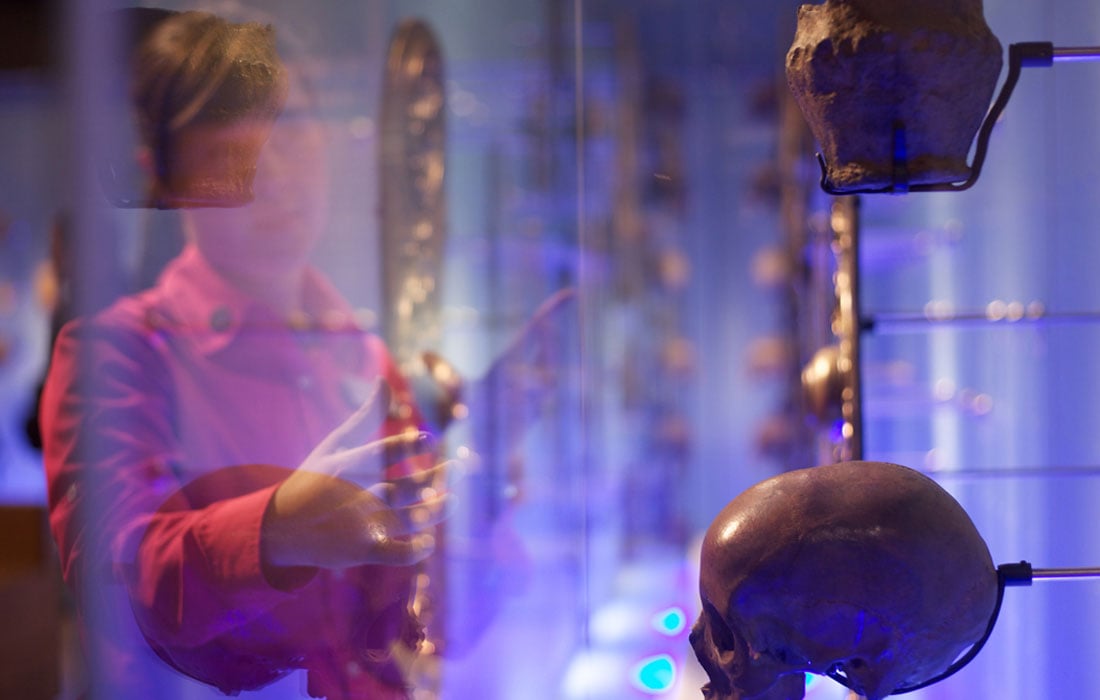
Cultural Ambition Project
Photo: © Briony Campbell
Access to entry-level roles
Many entry-level roles in the arts are taken by overqualified graduates, but a project in Wales is opening up opportunities to those most suited to them, says Sarah Mair Hughes.
Entry-level roles in the arts and cultural sectors are predominantly taken up by graduates, who can be overqualified for the role they are undertaking. Funding cuts and reduced team sizes have limited the opportunities to create additional entry routes, such as traineeships, resulting in a sector that is neither representative nor accessible to all. Moreover, as the workforce moves closer to retirement, and no trainees are coming through, there is a real risk of key skills leaving the sector.
“We believe young people need to experience our workplaces and meet the real people doing the real jobs”
Baroness Andrews’ report, Culture and Poverty, highlighted a need to make culture accessible and to ensure that those in more disadvantaged communities could participate. Young people across Wales have heritage venues based in their communities, but they don’t identify them as potential employers. This issue applies across the whole of the creative industries, where patchy careers advice on the creative workforce can lead to confusion about where the real jobs exist in the sector.
In England, Creative & Cultural Skills, ScreenSkills and the Creative Industries Federation have developed the Creative Careers Programme (funded by DCMS) to give young people opportunities to learn about the range of occupations in the sector. It also supports careers professionals to better understand the scale of the sector, the diversity of job roles, and the sector’s economic and social impact.
Sara Whybrew, Programme Director for Creative & Cultural Skills, said, “It’s hard to help young people make clear career choices if we only educate them via online information platforms. We believe young people need to experience our workplaces and meet the real people doing the real jobs, so they can better understand the breadth of occupations that exist, including the technical, creative and administrative.”
Cultural heritage placements
The largest piece of work that we currently manage in Wales is the Cultural Ambition project. Funded by the National Lottery Heritage Fund’s Skills for the Future programme and Welsh Government, it will create 33 placements for young people in cultural heritage organisations across Wales.
The young people applying for these placements are aged 18 to 24, not in education, employment or training, and non-graduate. This is not the typical person accessing an entry-level position within the sector, and so the project has been specially developed to support young people to learn within the sector and get a real sense of the roles that exist.
We were keen to work with young people who would benefit the most, but were aware they may be considered hard to reach. And so it was a challenge to get the message out about the project, but we did it by working with community groups and umbrella organisations linking with young people who are out of work, and holding open days in venues and youth centres.
The young people we met had a variety of skills and challenges, including low confidence in their ability to complete a qualification, attend an interview, or overcome anxiety and take on this new challenge. We worked with the host sites to develop a very simple application and set of interview questions, and the latter were circulated to the potential trainees in advance. We needed to make the process seem as accessible as possible as we knew that, for some, just attending the interview was a daunting task.
Qualifications and confidence
Every trainee is working towards a level two qualification, assessed by Cardiff and Vale College. The units were selected specifically because they can be achieved in most of the partner venues across Wales and because they develop transferable skills which, although learnt in a heritage setting, could be relevant to employment in other sectors.
We are currently working with over 20 venues and 15 trainees across Wales, and the feedback we have received has inspired us to continue working hard to increase the diversity and impact of our work.
Dai Price, Head of Museum at the Big Pit National Coal Mining Museum, said, “This project has given the trainee an amazing opportunity to gain confidence in a practical work environment, but it has also given her mentor the chance to work with someone from a different background and with different needs. This has resulted in new skills for the mentor and a sense of pride in helping the trainee to achieve whilst at Big Pit.”
Danielle Edmunds, cohort one trainee in Newport and Torfaen, said: “Since starting the Cultural Ambition project I feel my confidence and abilities have increased so much and I have really grown as a person. I love being in such an enjoyable environment with people who are really passionate about the jobs they have and the museum they work in. The training has given me a greater respect for the cultural sector and how important it is to keep it going.”
Recruitment culture
A year in, we can now reflect on the successes of this work and think more about its legacy. How do we change a recruitment culture so it is more inclusive, and expand the learning into the broader creative sector? This intervention received financial support to allow us to create the opportunities, so the next challenge is how to have a legacy which allows this project to live on beyond the end of the funded period.
Sarah Mair Hughes is Head of Skills Academy in Wales for Creative & Cultural Skills.
ccskills.org.uk
This article, sponsored and contributed by Creative & Cultural Skills, is part of a series promoting apprenticeships and challenging entrenched social inequalities, to create a more diverse workforce.
Join the Discussion
You must be logged in to post a comment.